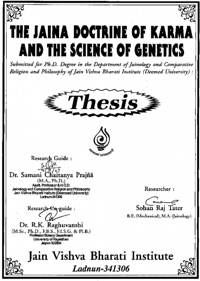Bondage Of Karma
There has to be a cause for the inequality we notice in material world (saṁsāra). We are unable to justify unequality based on external reasons. There has to be something internal which justify the worldly inequality.
Jainism is based on two basic substances:
- Ātmā (soul),
- Karma
Nine tatvas (fundamentals) of Jainism are based on ātmā and karma. To succeed in our crusade to free our souls, we must know all about karma and soul and their interrelationship.
It is a duality of light and darkness, purity and impurity, detachment and attachment, alertness and carelessness, awareness and ignorance and inside and outwardness. For worldly soul like us it is a battle between soul and karma. All we have to do is to disassociate soul from karma. In fact, our final and only object is to disassociate soul from karma and to realize our own (soul's) qualities. The karma theory of Jaina Philosophy is unique, rational, scientific and complex. In its true conceptual form, it is unique to Jainism. It supports the features of the Jaina religion, which distinguish it from other religions of world viz. the concept of independence of each individual soul and the teaching that self endeavour is the means to achieve such independence. It is scientific in the sense that it conforms to the basic premises of science. Karma reward or punishes us for our past deeds.
The material karma give rise to the feelings and emotions (abstract karma) in the worldly souls, which, in turn, cause the influx (āsṛava) and bondage (bandha) of fresh material karmas. Thus the relationship between the material and abstract karma can be described as one between the plant and seed. It should be remarked that soul is an entirely different from matter. Thus the transformation in a worldly soul (abstract karma) occur because of the intrinsic attributes of soul while the transformations (flux, bondage etc.) of material karma take place according to intrinsic attributes of matter. The emotional states of a living being are caused by karma particles and karma particles in their turn are caused by the emotional states. [1]
The law which regulates the action of karma is based on the principle of cause and effect, so that the saying, "as one sows so must he reap presents the whole doctrine in a nutshell. Every action, whether, mental or physical, is a sowing of the 'seed', or in the technical language of the Hindu Philosophy an engendering of karma. In the act of sowing the seed or engendering the karma the soul has the choice of acting or refraining from action, but when once the seed is sown or karma engendered, its freedom is replaced by an inevitable liability to bear its consequences. The harvest, which is sown must be reaped, gathered and assimilated in its unabated fullness. This is what constitutes the bondage of the soul. Karma, therefore, is a kind of force which compels the soul to bear the consequences of its right or wrong actions, and this force originates in the very action itself which is performed by the soul and at the very moment of its performance.[2]
Term karma means activity/actions by the living being mental, vocal or physical. The livingness means activity. If there is no activity, there is no life. Many actions are deluding, selfish or attachmental, while many are otherwise. The karma theory promotes the Gītā sermon for non attached, non deluding, non selfish or desirelessness for the effect of actions for useful, happy and world benefiting life. It promotes self elevation along with public elevation morally and physically.
In general, the karma theory aims at individual based spiritual upliftment. It is just unfortunate that this spiritualism has taken us too far to become self centred, egoistic and selfish. The individual of spiritualism became an isolated system. The isolationisms has its good and had effects for the society. However, the scientists have came to our help to indicate that the individual is not an isolated system. It is interconnected and interrelated system with environment and other entities each effecting one another. Thus, the scope of karma theory has gone very wide to include group karmas, national and international karmas. This has improved the utility of karma theory for spreading universal brotherhood and increasing the overall happiness in the world. It has a pregnancy of making the world more peaceful and as well as physically progessive.[3]
 Prof. Dr. Sohan Raj Tater
Prof. Dr. Sohan Raj Tater
 Doctoral Thesis, JVBU
Doctoral Thesis, JVBU